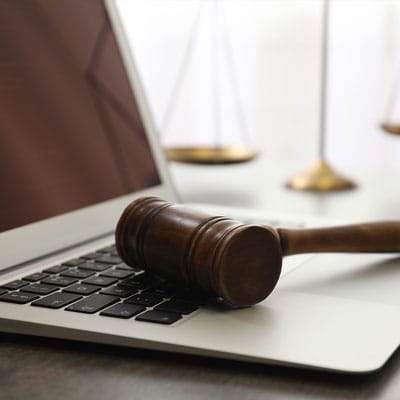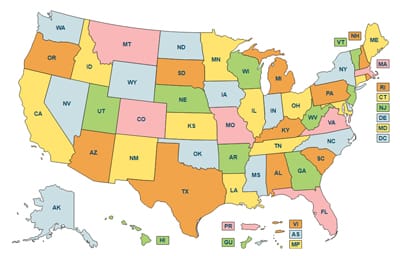
Curious about getting ordained online, but not sure about its legal validity? We’ll walk you through the legal aspects of becoming a minister online and how the law treats this status.
Online ordination is the process by which individuals become ordained via the internet, granting them the authority to carry out ministerial responsibilities, such as presiding over ceremonies.
The Universal Life Church Ministries is a pioneer of online ordination, and has ordained over 20 million people around the world – all via the internet. Anyone who feels so-called is encouraged to fill out the online ordination form and become a minister.
This type of ordination is legally recognized across the United States, and confers upon the recipient all the same rights and privileges as are offered to clergy members from more traditional faith organizations.
Let’s talk about why that is the case and how online ordination works.
Why Is Online Ordination Legal?
Ordination is a both a legal standing and a rite that an established religious organization confers upon members who meet its requirements.
While every faith tradition has a different process surrounding ordination, and may even have different “tiers” of ordination within their organization – legally speaking the end result is all the same (at least in the United States) – a person who has been ordained by the religious organization to which they belong is considered a “Minister”, and is granted all the authority associated with that title.
There is no legal requirement for what an ordination process must look like, as under the free exercise clause of the U.S. Constitution, religious bodies are empowered to practice their faith and structure their ordination process however they please, free of government intrusion or interference.
The online ordination method offered by the Universal Life Church is just a simplified version of other ordination processes – willing individuals complete the requirements, submit an application, and are approved into the ministry. The whole process takes only minutes to complete. If you’d like to get ordained, click the button below!
Can You Legally Officiate a Wedding?
Ministers who have been ordained online are authorized to perform legal wedding ceremonies. So far as the government is concerned, an online ordination from the ULC is as legally valid as any other.
Just being ordained isn’t always enough to officiate a wedding, however. For example, in order to legally prove that persons are officially and legally ordained, government officials will often require paperwork or documentation. Any materials that ministers might need to perform weddings in their area are available via the ULC’s online catalog.
The requirements to perform weddings can vary from state to state, and even county to county, which is why the ULC advises its members to consult its state wedding guide before officiating a ceremony.
Does Online Ordination Expire?

One common question we see is: how long does online ordination last? While each religious organization can decide how to handle its own ordination process, online ordinations from the Universal Life Church never expire – they are good for life.
The ULC views ordination as a lifelong commitment to one’s community, one’s spiritual journey, and oneself. Accordingly, ordinations offered online do not have an expiration date. No fees are required to maintain one’s ordination status, and ministers will maintain perpetual free access to their online accounts.
Legal History of Online Ordination
The legality of the online ordination process has been questioned by individuals and challenged in the courts, giving rise to its present status as a viable and wholly legal means of ordaining persons for ministry service.
The legal history of online ordination goes back to 1974, when an early iteration of the Universal Life Church – one not affiliated with the Universal Life Church Ministries – sued the United States Federal Government (in a case known as "The Universal Life Church, Inc. v. The United States of America") as a response to an Internal Revenue Service initiated challenge on the ULC's tax-exempt status.
The court eventually ruled in the church’s favor, pointing out that the manner in which ordination was provided did not in any way nullify its validity.
Relevant portions of the 1974 court ruling are excerpted below, as follows:
"Certainly the ordination of ministers and the chartering of churches are accepted activities of religious organizations... The fact that the plaintiff distributed ministers' credentials and Honorary Doctor of Divinity certificates is of no moment. Such activity may be analogized to mass conversions at a typical revival or religious crusade."
The ruling also included language which warned that the government was in no position to decide what religions were “acceptable” ones and which were not – a logical conclusion that also solidifies online ordination as a perfectly acceptable practice. That passage is included below:
"Neither this Court, nor any branch of this Government, will consider the merits or fallacies of a religion. Nor will the Court compare the beliefs, dogmas, and practices of a newly organized religion with those of an older, more established religion. Nor will the Court praise or condemn a religion, however excellent or fanatical or preposterous it may seem. Were the court to do so, it would impinge upon the guarantees of the First Amendment."
Utah’s Failed Attempt to Ban Online Ordination
Back in 2001, the state of Utah passed a law that barred ministers ordained online or by mail from performing legal marriage ceremonies. The ULC filed a lawsuit in response, challenging the constitutionality of Utah’s legislation.
Subsequently, a U.S. District Court ruled in the church’s favor, declaring such a rule to be unconstitutional and unenforceable by the state. In its ruling, the court explained that from a legal perspective, ordinations issued online are no different than those issued by other mediums such as by phone, fax, or in person – all methods of ordination that would have been permitted under the legislation.
In other words, the ruling provided legal weight to the notion that ordination is ordination – regardless of how it is issued – and that online ordination is just as valid as any other form.
Where Online Ordination is Legal Today
Fast forward to the present, and online ordination has been solidified as a fully legitimate avenue to ordination – one that is legally recognized in just about every U.S. state. To learn more about the legal history of online ordination, and the relevant outstanding cases today, please visit the ULC case law website.
How to Get Ordained Online
Thanks to the protections afforded by the U.S. Constitution, and the hard work of the ULC legal team, ministers of the Universal Life Church enjoy the same rights and privileges as any other members of the clergy. If you’d like to get ordained, the online process is simple and easy to complete. Just fill out the application on our website, hit submit, and your ordination will be processed instantly. Click the button below to begin!

